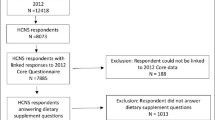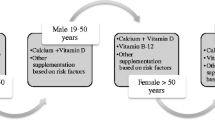Abstract
Objectives
Health Canada recommends vitamin D supplements (10 ώg/d) for Canadians aged ≥50 years, but no data are available on adoption of this recommendation. Accordingly, this study was conducted to determine the current use of vitamin D supplements among British Columbian adults 50 years and over, and to explore relationships among vitamin D supplement use, socio-demographic variables, and knowledge, attitudes and beliefs about vitamin supplementation.
Methods
A population-representative stratified sample, recruited by random-digit dialling, completed a telephone-administered survey in late fall of 2008. Respondents provided details on supplements used in the past month (dosage, frequency, etc.) and demographic data, and responded to statements reflecting health beliefs about supplements, from which a Supplement Health Belief score was calculated. Eligible non-respondents indicated their age, sex, and whether they had used a supplement within the past month.
Results
Similar proportions of participants (n=969) and non-respondents (n=1,027) reported any supplement use in the past month. Among participants, 60% had used a vitamin D supplement (median intake among supplement users was 10 ώg/d) and 3% exceeded the Tolerable Upper Intake Level of 50 ώg/d. In multivariate analysis, vitamin D supplementation was significantly associated with female sex, not smoking, higher educational attainment, having a health care professional recommend supplement use, and a higher Supplement Health Belief score.
Objectifs
x: Although most older adults used a vitamin D supplement, further dissemination of this recommendation is needed.
Résumé
Objectifs
Santé Canada recommande la prise de suppléments de vitamine D (10 ώg/j) pour les Canadiens de 50 ans et plus, or il n’existe pas données ayant trait à l’adoption de cette recommandation. Cette étude a donc été effectuée afin de déterminer l’utilisation de suppléments de vitamine D des Britanno-colombiens de 50 ans et plus, et d’étudier les relations existant entre la prise de suppléments de vitamine D, les variables socio-démographiques ainsi que les connaissances, attitudes et croyances concernant la supplémentation en vitamines.
Méthodes
Un échantillon stratifié représentatif de la population et recruté au moyen d’appels téléphoniques aléatoires a répondu à une enquête par téléphone à la fin de l’automne 2008. Les répondants ont détaillé l’utilisation de suppléments dans le mois écoulé (dose, fréquence, etc.) en plus de fournir des données démographiques et de répondre à des énoncés reflétant leurs croyances en santé sur les suppléments, à partir desquels un indice de croyances en santé sur les suppléments a été calculé. Les répondants non admissibles ont indiqué leur âge, sexe, et s’ils avaient utilisé un supplément dans le mois écoulé.
Résultats
En proportion identique, les participants (n=969) et non-répondants (n=1 027) ont rapporté l’utilisation de divers suppléments dans le mois écoulé. Des participants, 60 % ont utilisé un supplément de vitamine D (l’apport médian parmi les utilisateurs de suppléments était de 10 ώg/j) et 3 % ont dépassé l’Apport maximal tolérable de 50 ώg/j. L’analyse multivariée a montré que la supplémentation en vitamine D était significativement liée aux caractéristiques suivantes: sexe féminin, non fumeur, niveau d’instruction supérieur, avoir un professionnel de la santé ayant conseillé la prise d’un supplément et un indice de croyances en santé sur les suppléments plus élevé.
Conclusion
Même si la plupart des adultes plus âgés prennent des suppléments de vitamine D, il est nécessaire de diffuser plus largement cette recommandation.
Similar content being viewed by others
References
Institute of Medicine. Dietary reference intakes for calcium, phosphorus, magnesium, vitamin D, and fluoride. Washington, DC: National Academy Press, 1997.
Canadian Cancer Society. Vitamin D. Available at: https://doi.org/www.cancer.ca/Canada-wide/Prevention/Use%20SunSense/Vitamin%20D.aspx?sc_lang=en (Accessed July 28, 2009).
Osteoporosis Canada. Vitamin D: A key factor in good calcium absorption. Available at: https://doi.org/www.osteoporosis.ca/index.php/ci_id/5536/la_id/1.htm (Accessed July 28, 2009).
Katamay SW, Esslinger KA, Vigneault M, Johnston JL, Junkins BA, Robbins LG, et al. Eating Well with Canada’s Food Guide (2007): Development of the Food Intake Pattern. Nutr Rev 2007;65(4):155–66.
Health Canada. Canada’s Food Guide, 2007. Available at: https://doi.org/www.hc-sc.gc.ca/fn-an/food-guide-aliment/index-eng.php (Accessed July 28, 2009).
Rochon M. Sampling methodology and ASDE random survey sampler. Available at: https://doi.org/www.surveysampler.com/pdf/Sampling%20Methodology%20and%20ASDE%20Survey%20Sampler.pdf (Accessed November 26, 2009).
Strecher V, Rosenstock IM. The Health Belief Model. In: Glanz K, Lewis F, Rimer B (Eds.), Health Behavior and Health Education: Theory, Research and Practice. San Francisco, CA: Jossey-Bass, 1997.
Barr SI. British Columbia Nutrition Survey: Report on supplements, 2004. Available at: https://doi.org/www.health.gov.bc.ca/prevent/nutrition/pdf/nutrition_supp.pdf (Accessed July 28, 2009).
Canadian Health Measures Survey: Vitamin D blood plasma concentrations in the population, 2009. Available at: https://doi.org/www.statcan.gc.ca/daily-quotidien/090702/dq090702a-eng.htm (Accessed July 28, 2009).
Radimer K, Bindewald B, Hughes J, Ervin B, Swanson C, Picciano MF. Dietary supplement use by US adults: Data from the National Health and Nutrition Examination Survey, 1999–2000. Am J Epidemiol 2004;160(4):339–49.
Sebastian RS, Cleveland LE, Goldman JD, Moshfegh AJ. Older adults who use vitamin/mineral supplements differ from nonusers in nutrient intake adequacy and dietary attitudes. J Am Diet Assoc 2007;107(8):1322–32.
Kreuter MW, Chheda SG, Bull FC. How does physician advice influence patient behavior? Evidence for a priming effect. Arch Fam Med 2000;9(5):426–33.
Health Canada. Food Guide facts. Background for educators and communicators. Ottawa, ON: Minister of Supply and Services Canada, 1992.
British Columbia (BC) Stats. Summary of smoking rates for BC: September 2006 to August 2007. Available at: https://doi.org/www.bcstats.gov.bc.ca/data/ssa/reports/tobacco/smoke07060707.pdf (Accessed July 28, 2009).
Canadian Cancer Society. When Daylight Savings Time stops — Consider taking Vitamin D. Available at: https://doi.org/www.cancer.ca/ontario/about%20us/media%20centre/od-media%20releases/when%20daylight%20savings%20time%20stops%20consider%20taking%20vitamin%20d.aspx?sc_lang=en (Accessed November 27, 2009).
Human Resources and Skills Development Canada. Indicators of well-being in Canada. Available at: https://doi.org/www4.hrsdc.gc.ca/.3ndic.1t.4r@-eng.jsp?iID=6 (Accessed July 28, 2009).
Author information
Authors and Affiliations
Corresponding author
Additional information
Acknowledgements: The authors are indebted to Jung-Un Choi for her technical assistance and Roch Duhamel at Harris Decima for his technical support. This research was supported by a grant obtained through the Vitamin Class Action settlement.
Conflict of Interest: None to declare.
Rights and permissions
About this article
Cite this article
Green, T.J., Barr, S.I. & Chapman, G.E. The Majority of Older British Columbians Take Vitamin D-containing Supplements. Can J Public Health 101, 246–250 (2010). https://doi.org/10.1007/BF03404383
Received:
Accepted:
Published:
Issue Date:
DOI: https://doi.org/10.1007/BF03404383




